
27 minute read
immersed in the story
GENIUS: ARETHA
USA TODAY SPECIAL EDITION
Advertisement
‘ The Look’ is right on time
Accuracy in sets, props, makeup and more is essential to immersing viewers in the story
“Genius: Aretha” required building some 250 sets, including a painstaking re-creation of the Atlantic Records studio in Manhattan. RICHARD DUCREE/NATIONAL GEOGRAPHIC
USA TODAY SPECIAL EDITION

The production team knew how important it was to depict C.L. Franklin’s house accurately, since so many people are familiar with it. RICHARD DUCREE/NATIONAL GEOGRAPHIC
Jacqueline Cutler
Special to USA TODAY
It’s hard enough to re-create looks from 70 years ago, but making those looks specific and accurate requires a whole new set of skills. Carpenters who craft period furniture, prop masters who add perfect finishing touches, costumers who sew lapels on era-appropriate material, and makeup artists who know that frosted, not matte coral, was the rage — all are vital to creating The Look.
Putting it all together is the production designer, and framing it in the lens is the director of photography. No one thinks about color and how pigmentation reflects moods more than artists do. They become animated, describing how green runs the gamut of emotions or how sunlight reacts with a particular shade. They experience color in a way the rest of us mortals don’t.
“I made a color profile from the birth of Aretha to the ’70s vintage look,” explained Kevin McKnight, director of photography on “Genius: Aretha.”
“The high ends of the tones have a warmth; the shadows, I contaminated them with cyan, a bluish-green. The highlight represents warmth and safety, the cocoon of her home. They’re very warm compared to New York, the business world, Atlantic Records, which is much cooler. The warmth is reserved for moments she feels safe. When she is in her home at night, and it’s only her, and the outside world melts away.”
McKnight had worked with Cynthia Erivo not long before, on the HBO thriller ‘The Outsider,” so he knew her look and how best to feature her.
“I saw one person on ‘The Outsider,’ and when she showed up as Aretha, my jaw dropped,” he said. “I spent months with her on ‘Outsider.’ This was a drastically different persona, cadence and talking. Aretha was a complete flip from one character to another. Cynthia has beautifully expressive eyes, and I try to capture those. They say a lot, with both characters, and they express so much.”
Erivo, a petite Brit, bears little resemblance to Detroit’s Franklin, but viewers will forget the differences seconds into these eight hours. Not only are the wigs, makeup and clothes spot-on, but the series also nails The Look of churches, theaters and offices. And it does so spanning the decades and through the experiences of Franklin, whose bold singing concealed an innate shyness, a quality the series carefully, quietly reveals.
“What’s expansive with this character is, Cynthia goes from deep internal to expressive moments,” McKnight said. “We try hard to illustrate those moments with a lot of close-ups. I like to get cameras so close to her. This is an engaged character study. We are trying to make the audience feel in her world — trying to show the audience the vortex of Aretha.”
“It isn’t a biopic,” McKnight said. “We are trying to show a person and their growth as they go through the vicissitudes of life. The later episodes are almost a Shakespearean movement of power as the queen ascends and the king
Kevin McKnight
Director of photography
Continued on page 18
GENIUS: ARETHA
USA TODAY SPECIAL EDITION
Continued from page 17
(her father, C.L. Franklin) descends. And queens can be nasty! We all know the fairy tale.”
“Genius: Aretha” is determined to show not only how Franklin lived but where. Most productions can take a house on a studio lot and dress it to fit a project. Not here. Millions of fans know what the Rev. Franklin’s church, the Franklin family home and Aretha Franklin’s recording sessions looked like. Every set had to be not just evocative of the time but completely accurate.
“We had to find a place that mimicked in a way what people identify as C.L. Franklin’s house in Detroit, a neo-classic yellow brick building that is still there,” said production designer Tim Galvin, who oversaw construction of some 250 sets. “And we found a location that is pretty great, very emblematic of what the real house is like, and then we just made the windows match. That sort of gives you a hint of what the inside is like, and then you just have to sort of fill in the blanks.”
The reverend “was a very proud person, and also kind of formal in everything,” Galvin said. That careful, buttoned-up quality is evident on the set of the Franklin home.
The formal living room has a Steinway & Sons piano. Engraved over the fireplace mantle: “How shall we sing the Lord’s song in a strange land? Psalm 137.” An Underwood typewriter sits on a desk in the sunroom, near stacks of board games. A grandfather clock and a phone nook, as better-appointed homes had, are nearby. The TV is in a wooden console, and the couch is covered in plastic.
C.L. Franklin’s office carries the air of seriousness appropriate to the pastor of a large church. His heavy wooden desk has a pipe rack. Across from it, bookshelves hold Bibles, an encyclopedia, and a set of the Harvard Classics. Even with the highest resolution TV, it’s unlikely any viewer would notice that the Freemason certificate on the wall is made out to Clarence LaVaughn Franklin and dated 4 July 1945. Yet there it is on a set in Atlanta.
That attention to detail is evident in every room. The kitchen has cast iron pans, a Frigidaire with rounded edges, and the feel of a place where solid meals were made by people who knew how. Aretha’s childhood bedroom has Nancy Drew books and paper dolls. Hardy Boys books, baseball cards and Tinker Toys decorate the boys’ room.
Another part of the soundstage was turned into the Atlantic Records studio at 234 W. 56th St. The control room’s sanctum boasts a control board and a reel-to-reel recorder, all placed precisely as the originals were. With its orange couch, overflowing ashtrays, and copies of Life magazine, Jerry Wexler’s office displays framed photos of Joe Morris, The Drifters, Ray Charles, Aretha Franklin and Bill Haley & His Comets.
The most challenging aspect, Galvin said, was “trying to be honest about her world and represent things as true as we could. She wasn’t a sharecropper. When she was young, her father was struggling, but then she had a more settled life. He became a pillar in the community, so we had to illustrate that middleclass African American world. Then we had to represent her on her own — her life with Ted White in New York, a walk-up apartment in the ’60s. And then once she had those hits, she got her money, and she got that nice apartment that we built. Showing the change and the growth over time is the challenge.”
For McKnight, though, the biggest challenge was the fast pace of television.
“For me, it not slipping out of the art and into commerce,” he said. “It is to stay true to our intentions. It’s quick and easy to fall into the conventions of TV, but everything we do has creative intention. We are not just putting a box around the action. We are trying to make the audience feel engaged.”
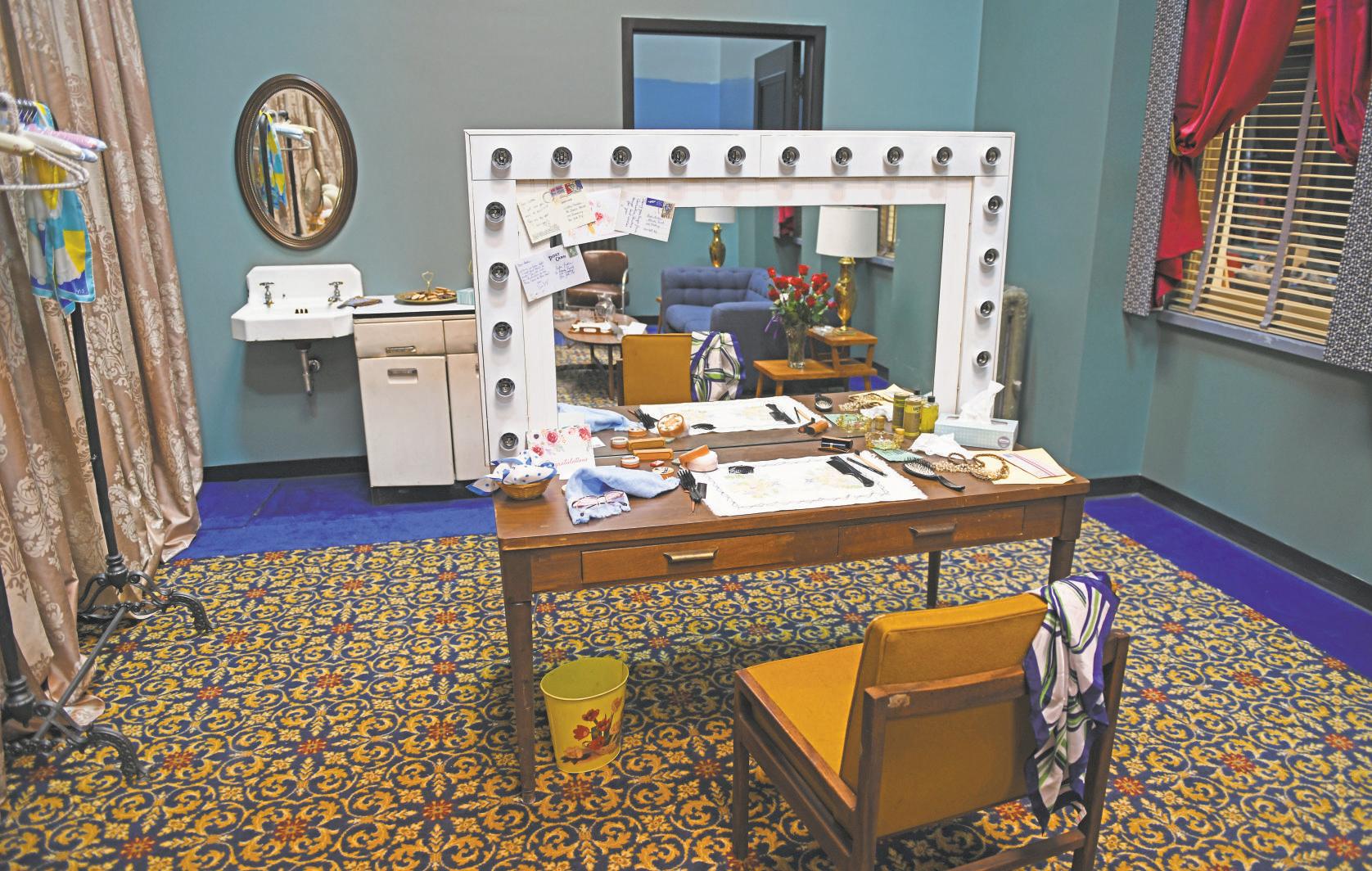
Even the smallest details of the sets in “Genius: Aretha” are period-appropriate. PHOTOS BY RICHARD DUCREE/NATIONAL GEOGRAPHIC
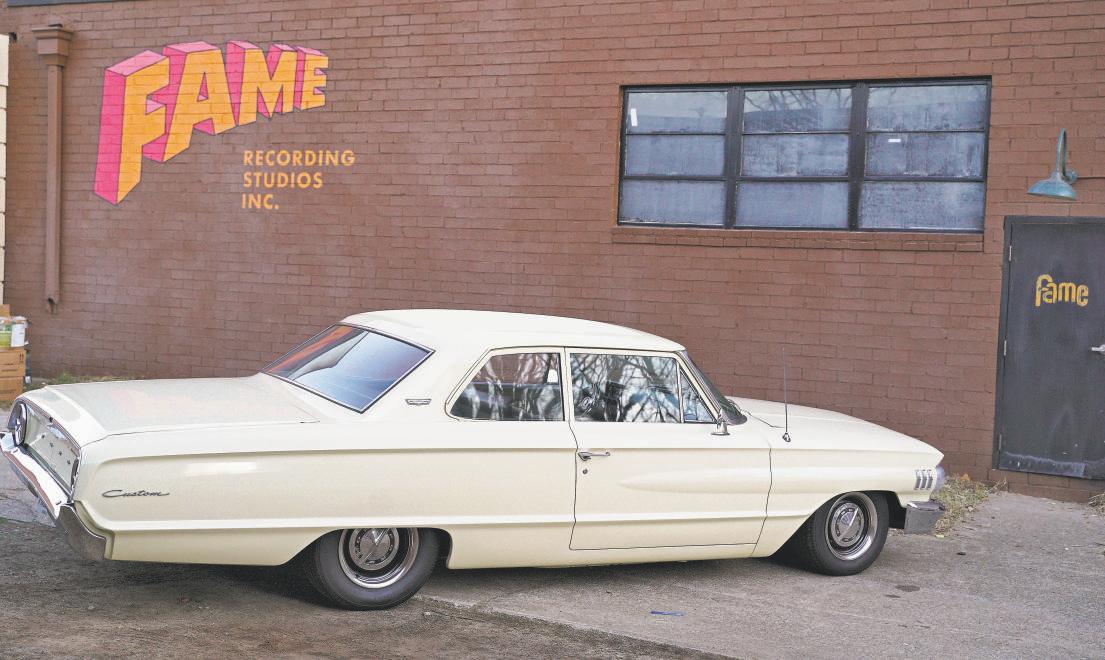
Production design encompasses architecture, automobiles and much more.
20 GENIUS: ARETHA
What is genius?
Shaian Jordan
Actress, plays young Aretha Franklin Someone that’s brilliant, someone that likes to turn heartbreak into song, someone able to elaborate on something. Someone who is capable. Someone who is able to create and have their own ideas and go outside of their comfort zone. Someone who makes an impact on the world.
Courtney B. Vance
Actor, plays Aretha’s father, the Rev. C.L. Franklin When you go back into this series, Picasso and Einstein and Aretha, they all had to struggle. Picasso’s parents, Aretha’s parents, Einstein’s parents had nothing. But geniuses are consistently trying. They don’t give up. The difference between Itzhak Perlman and a high school violin teacher: The teacher stopped after 4,000 hours, and Itzhak kept going and focusing on that one thing and kept at it. I think there is genius in everyone, but everyone isn’t able to keep going for 10,000 hours. It has to be something you can do and do and do. And Aretha sat down at the piano, and she just closed her eyes. (Music producer Jerry) Wexler realized that’s where her genius was.
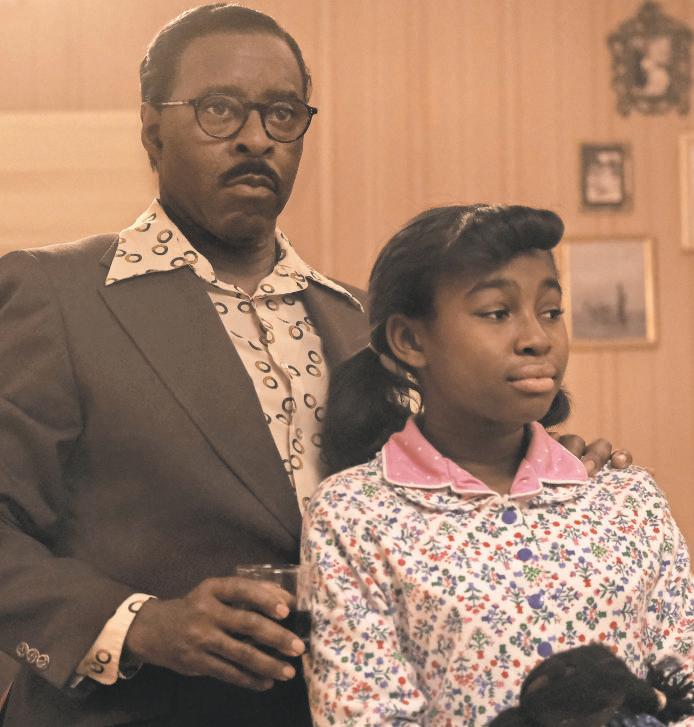
Vance & Jordan. RICHARD DUCREE/NATIONAL GEOGRAPHIC Erivo. RICHARD DUCREE/NATIONAL GEOGRAPHIC
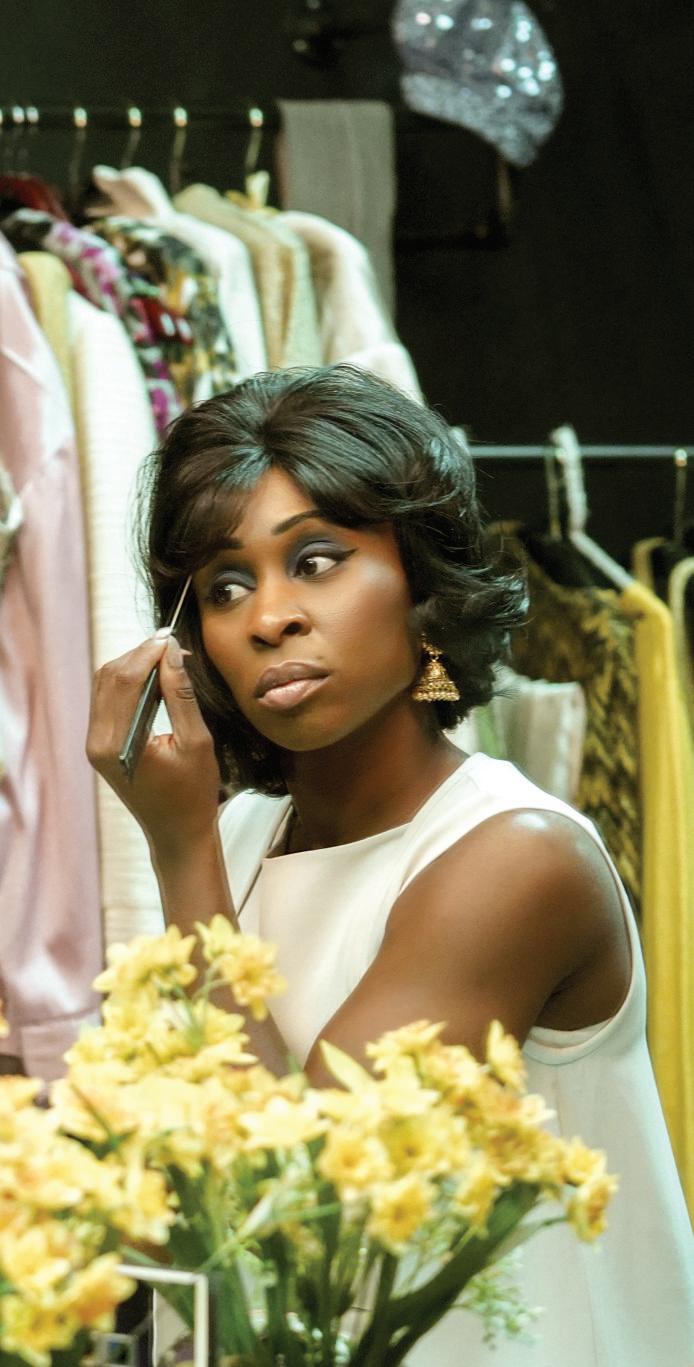
Cynthia Erivo
Actress, plays Aretha Franklin Genius is creating things where there is an impossibility. The way she would make music — to do something out of sheer will, to create when you don’t have the tools to do so because it is in your DNA — is genius. Doing this against all odds and still managing to improve the world is genius.
Pauletta Washington
Actress, plays grandmother Rachel Franklin Fearlessness. And because I feel like I am living with one myself — I feel my husband (Denzel Washington) is one, I really do — it is someone who does extraordinary, beyond extraordinary, thinking. It starts in the mind and the fact that they allow what is in their mind to be manifested because they don’t fear it and get totally out of its way.
Marque Richardson
Actor, plays saxophonist King Curtis Genius, to me, is someone that’s connected. It’s a gift from a higher power. And you know it when you see it. With Aretha, even watching her in “Amazing Grace,” you can see it in her eyes. You can see there is so much being said without being said. It’s measurable but also immeasurable.
Anthony Hemingway
Executive producer, director Genius can come in different ways. Partly, what makes Aretha a genius is her connections and how she brought people together. To have this ability, that is transformative and lasting, is beyond exceptional. Many people have qualities that are special. It’s a little different when you have the ability to affect all types of people. Why I am happy to redefine genius in this aspect: You see someone come from a place in life and constantly told negatives and someone who had the tenacity to persevere and reach the level that was divine to them. It is as simple as “anything is possible.”
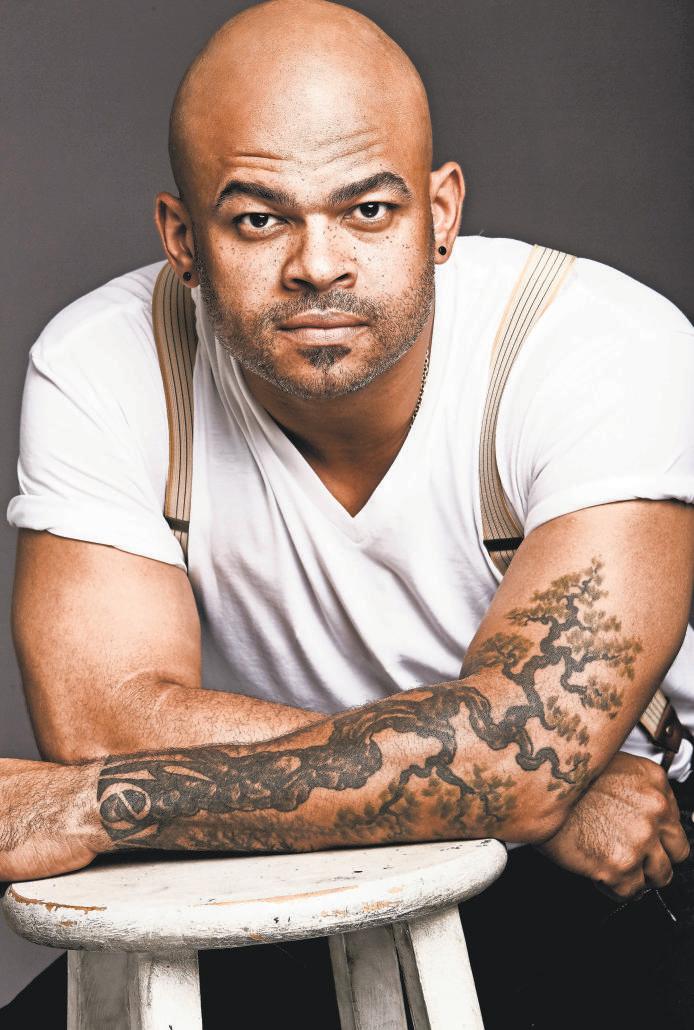
Hemingway. WES KLAIN
Neema Barnette
Director Geniuses are called to a higher calling. Certain people can go to a certain level in the art, and other people can perfect the gift they have. When you are at a crossroads in life and have to make a decision — Picasso or Einstein, art or mathematics — geniuses choose to go beyond. Other geniuses like Aretha, and many others, who make a gift and then make a decision, give service to people. Aretha embodied the connection between spirituality and rhythm and blues and connected them all. Genius is knowing that “if you are thinking your dream is just for you, you are dreaming too small.” That’s a quote from my friend Ava DuVernay.
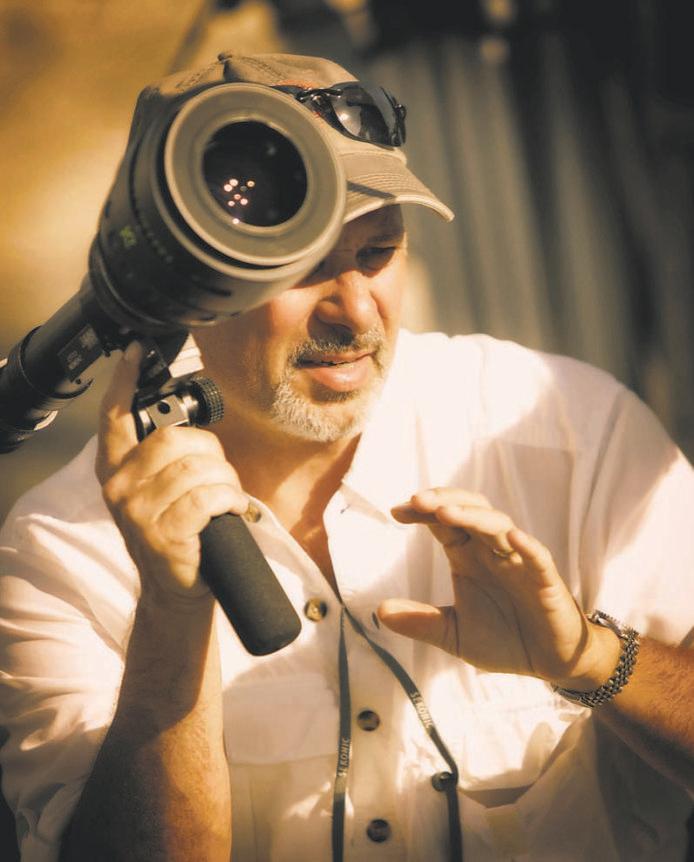
McKnight. JD MURRAY
Kevin McKnight
Director of Photography For me, it has to do with a greater connection, humanity-wise. It’s not intellectual. That’s just cognitive learned skills for me. It is about connecting. Aretha’s genius was she connected not just with 200 people, she connected with millions. She broke barriers. It is more important for us as people to be connected, allowing us one people, one address, as in planet Earth. As soon as we can get rid of labels, we experience greater connections. It’s how I raise my kids. Genius is easy to attribute intellectual stuff or cognitive skills to. It’s got to go much deeper than that.
Terence Blanchard
Composer Genius is that rare combination of having a certain amount of intelligence that requires remembering book knowledge and being able to take that information and being able to see the possibilities. Most people don’t have the capability to see those possibilities and combinations. Most people can’t see the forest for the trees.
Raphael Saadiq
Executive music producer Genius is Aretha because her starting in a church and traveling on the revival tour market and chitlin circuit and watching famous gospel singers sing and to be able to translate that into jazz. And then, to make another jump into pop-soul with (Jerry) Wexler and meeting those white musicians at Muscle Shoals (Alabama), The Swampers. You had the perfect combination. The genius of Aretha, she kept landing on the right lights.
Tim Galvin
Production designer Some person who kind of sees the connections in the world that other people can’t. How do they do it? They just have a gift, maybe, but they also have some kind of skill. It is seeing something in the world that other people haven’t seen before and making something new of it.
Jennifer Bryan
Costume Designer To me, it’s a rare and exceptional quality that some human beings are gifted with — not all of us. It is that ability to see beyond what normal beings see. Geniuses seem to have a further vision beyond what is just in front of them. I think that’s what makes them different from us non-geniuses.
Louisa V. Anthony
Head of the hair department Aretha Franklin is genius because of her natural ability to fuse the sounds of gospel, rhythm and blues, and soul to create a new sound, all her own.
Marietta Carter-Narcisse
Head of the makeup department Genius is the innate ability to surpass the average effortlessly.

Carter-Narcisse. COURTESY OF CRISTINA ROSARIO Bernstein. STEWART VOLLAND
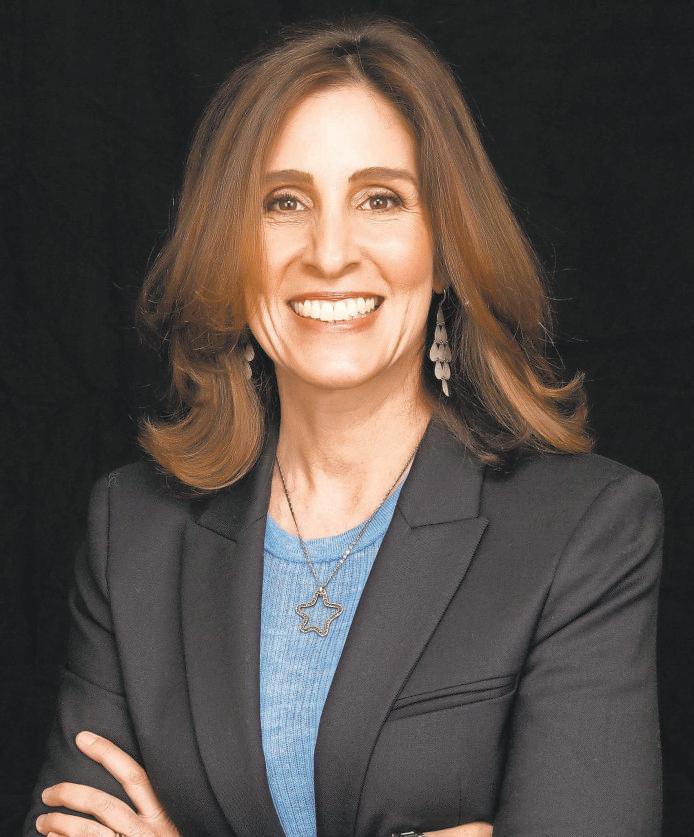
Carolyn Bernstein
Executive vice president, global scripted content and documentary films at National Geographic Someone who is able to look at the world in a completely unique way and create something that is not only a first but has lasting impact. There are lots of people who are innovative but whose work doesn’t stand the test of time. That’s the way we try to understand it; the confluence between real innovation and the lasting impact of that innovation. It certainly applies to Einstein and Picasso, and now Aretha. It is a lot to live up to.
Suzan-Lori Parks
Showrunner, executive producer, writer Genius is something that lights a fire in another person. ... It is not just for me. It is not me, me, me. Look at us, how beautiful we are, and strong we are. And if people can see that through the Queen of Soul and we can see how beautiful we are, not just telling a story of someone who was smart or who made a lot of money painting. That paved the way for this. A woman genius, an African American genius, who is a mother, who is contemporary. The task of genius is different in modern times. I would encourage geniuses of today by actively going out there and lighting fires in others in every way. That’s what our job as geniuses is — fire starters.
Brian Grazer
Executive producer A genius has to have done something that is paradigm shifting, that impacts our culture over generations. Aretha Franklin’s music punctuated and elevated the genre of rhythm and blues. She reached the highest pinnacle of artistry while overcoming obstacles, making it more difficult to become one of the most beloved and impactful cultural icons of our century. It is this genius that needs to be told.
USA TODAY SPECIAL EDITION
GENIUS: ARETHA
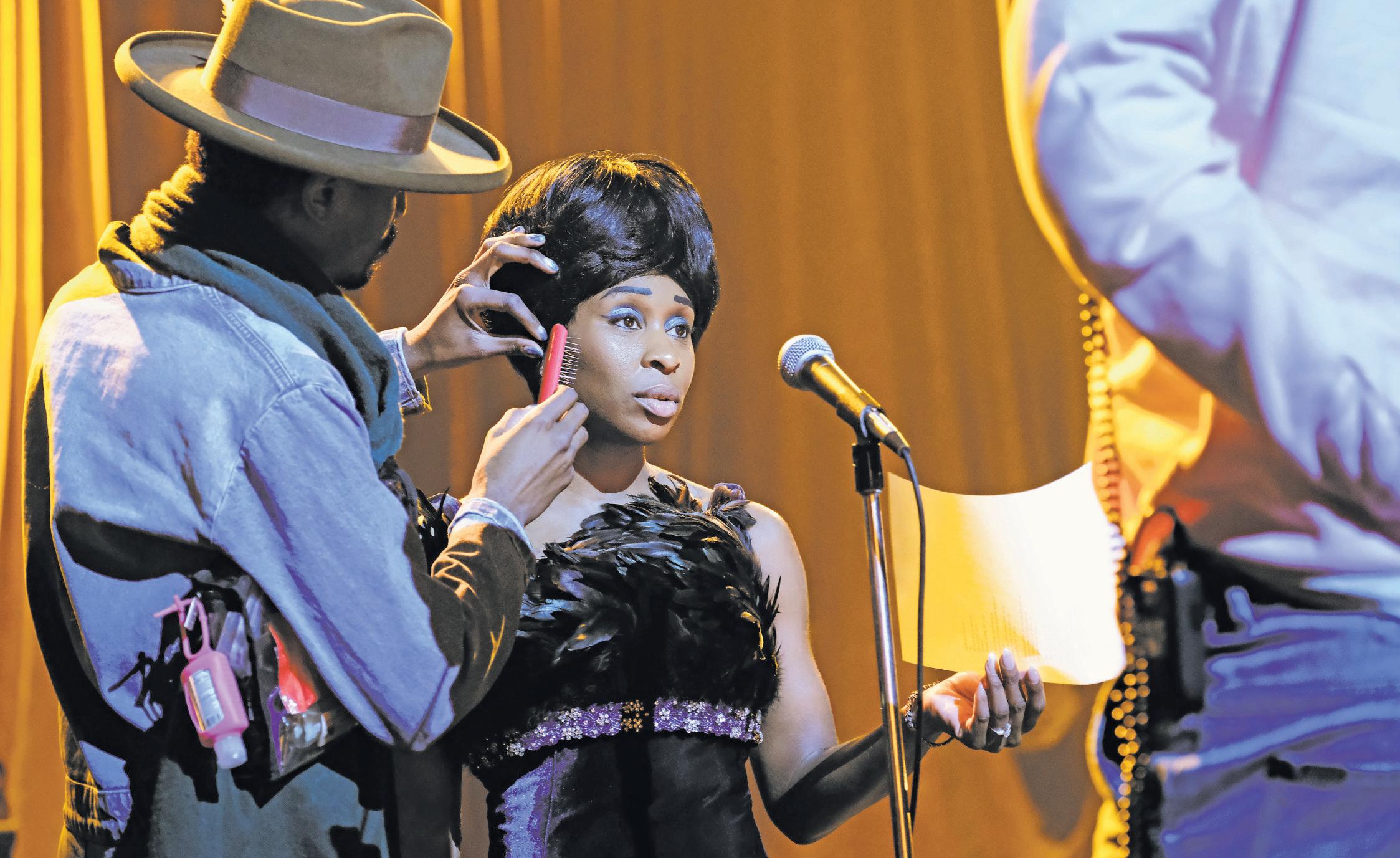
Cynthia Erivo gets a touch-up during filming. The series’s hair and makeup team studied details all the way down to the fingernails. RICHARD DUCREE/NATIONAL GEOGRAPHIC
Natural looks take work
Hair and makeup artists also had to be historians
Jacqueline Cutler
Special to USA TODAY
Aretha Franklin was belting out “(You Make Me Feel Like) A Natural Woman” at the Kennedy Center Honors. Carole King, the songwriter and one of the night’s honorees, was happily losing her mind. President Barack Obama was singing along, like the rest of the audience.
Then Franklin stood up from the piano she’d been playing, shed her fur coat, and let her voice rip. Even five years later, this lift-off-the-roof performance — a moment millions saw live on TV and more than 45 million have viewed since on YouTube — retains its power.
And that’s why Marietta Carter-Narcisse, head of the makeup department on “Genius: Aretha,” was watching it. Again. She had no idea how many times she had seen it.
The magnificent 2015 paean to being a natural woman was sweetly ironic in Carter-Narcisse’s domain, the makeup and hair trailer, where no one who comes through leaves in a natural state.
Although star Cynthia Erivo had her own dedicated makeup artists for “Genius,” Carter-Narcisse was in charge of everyone else. Director Anthony Hemingway had tasked her with “being as true to the period as we possibly could,” and she took that mandate seriously.
She knows the history of makeup.
“Some of the Black women did not have the makeup available to them white women had,” Carter-Narcisse said. “I had to take into account geography.” For example, Southern Black women attending church on the gospel circuit did not usually use cosmetics. In upscale congregations, such as the Rev. C.L. Franklin’s in Detroit, many Black women did. Performers certainly used makeup, and Franklin rocked her own look.
“The Supremes were groomed,” Carter-Narcisse said. “Aretha and her sisters were quite raw. She was not polished. She was not.”
But Franklin stayed au courant. And it was Carter-Narcisse’s job to ensure that the scores of cast members and hundreds of extras were as well.
That oversight extended even to the manicures.
USA TODAY SPECIAL EDITION
Multiple wigs were created to give series star Cynthia Erivo the various looks of Aretha Franklin — and to add verisimilitude
to the set. RICHARD DUCREE/ NATIONAL GEOGRAPHIC
“We try to make sure nails are authentic,” she said. “No acrylics, no French, no squared, no bejeweled nails, and maintain the color of the nail polish. The ’40s and the ’50s were reds; the ’60s and the ’70s were frosted colors.”
Carter-Narcisse keeps drawers with various shades of foundation, shadows and lipsticks precisely organized. A few yards and several chairs down the glam truck was Louisa V. Anthony, head of the hair and wig department.
Just as makeup saw huge changes over the decades, consider how Black hairstyles evolved, from processed to natural. Anthony’s closet contains a collection of natural hair wigs, including many fluffy Afros. “My brothers had the Afros, back in the day, and put the pick in there,” Anthony said, as her hands fluttered over a wig. “You have to zhuzh it, bring it together.”
A lifelong Franklin fan, Anthony was happy to have the 2 a.m. wake-up calls to be on set by 4 a.m. She had taken her mom to see Franklin once and beamed as she recalled, “It was amazing.”
It was late on what no one realized would be the last night on set before COVID precautions shut it down. The moon burned bright as Coree Moreno, Erivo’s personal hairstylist, found a couple of folding chairs, set them up in a parking area, and explained how he helped turn Erivo’s famed platinum buzzcut into the many styles of the Queen of Soul.
“Everything you see, I built,” he said. “Being 26, I had to do so much research for this.”
He crafted eight wigs for Erivo and was surprised by how heavy some of them were. All of them strictly adhere to Franklin’s looks.
“She evolved in her beauty, from the ’60s cat’s eye and deliberate brow, and then she let her hair be natural,” he said. “It felt like she was re-establishing her beauty identity. She was very put together for an African-American woman in the ’60s, emulating the society but more of a Caucasian hair, sculpted. It’s kind of like a representation of who she was. As she became more famous, her hair got bigger.”
Like everyone working on the look of “Genius: Aretha,” Moreno studied Franklin’s evolving styles. He is positive that Franklin did her own makeup, a conclusion backed by at least 10 photos of her applying makeup.
“She in no way, shape or form had a makeup artist,” Moreno declared. “The brows were not even. The beauty marks moved all over her face.”
And as Moreno studied her, this young man, who describes himself on Instagram as a “hair industry prince,” acknowledged how much he had learned about Franklin and about the decades the show spans.
“I came away with a newfound respect for a fashion icon in that era,” he said. “No one else was carrying themselves in that manner. And, it really showed a level of luxury, and she radiated luxury and a refined esthetic. She kept it fly. She was so fly.”
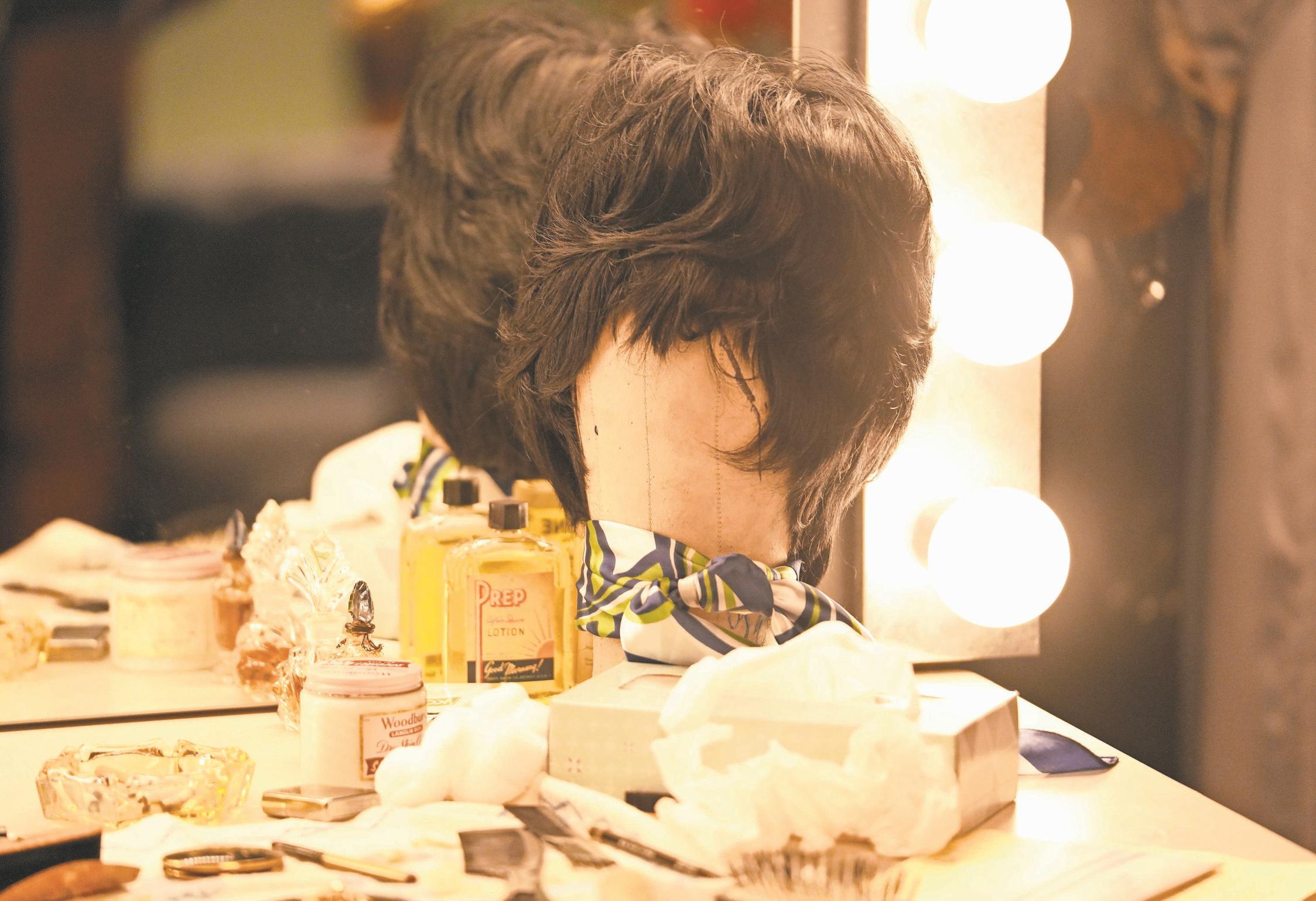
“She evolved in her beauty, from the ’60s cat’s eye and deliberate brow, and then she let her hair be natural. It felt like she was re-establishing her beauty identity.” Coree Moreno
Cynthia Erivo’s personal hairstylist
GENIUS: ARETHA
USA TODAY SPECIAL EDITION
Franklin’s journey is shared by many
Struggles and triumphs resonate with women
Jacqueline Cutler
Special to USA TODAY
“Respect” has always been so much more than a song. It’s an anthem, a rallying cry. And it is a demand — but one delivered in the nicest way — as a request.
As Aretha Franklin’s signature song, it’s one we dance to, and when we do, there’s a freedom that courses through us. It’s a liberating song, one about a woman who has had enough and has the confidence to walk out. Any woman who has ever been told what to do by a man (don’t bother doing the math) understands it on a visceral level.
While all women can relate to Franklin throwing down the gauntlet, many Black women, particularly those of certain age, have taken journeys similar to Franklin’s.
Whether it’s someone like director Neema Barnette, who grew up in the North where blatant racism wasn’t codified, or actress Pauletta Washington, who spent her childhood in the South under Jim Crow, or costume designer Jennifer Bryan, who emigrated from Jamaica to the U.S., they share a journey. Their formidable talent, artistic passion and work ethic overcame all obstacles.
In “Genius: Aretha,” Washington plays Rachel Franklin, Aretha’s grandmother, who held the family together. When the Rev. C.L. Franklin toured, Rachel took care of Aretha, her sisters and her brother. Later she helped rear Aretha’s children, her great-grandchildren. Rachel was not the passive type; she raised the children properly.
“When you think about it, in many cultures, the grandmother is the head of the house, the matriarch, even if the mother is actively present,” Washington said. “The mother always defers to the grandmother; my children did, and I did. And my mother was very active in my home. I think it is the wisdom. I was happy when I was given this role because it is an opportunity to keep alive that figure in the family.”
Her own family includes four children with her husband, Denzel Washington. Aretha Franklin, like so many women, fell under the Denzel dazzle.
“We spoke, and she loved my husband,” Washington said evenly. “I remember — I’m not sure which show, if it was ‘Raisin in the Sun’ or ‘Julius Caesar,’ one of those Broadway shows — she came backstage. It just so happens I wasn’t there that night. Aretha was always giving gifts, and she gave him a crystal pyramid. She thought of him as a king and respected his work.”
Over the years, they met several times, and Washington has a lingering image of the singer.
“The last time was at the inauguration of President Obama, and we were staying at the same hotel,” she remembered. “She was sitting on what looked like a throne, with a white fur draped all around her. It could not have been a better set-up if you planned it. We came over and had a lengthy conversation. She was tough at first with me. She wasn’t all that hunky-dory because of Denzel. I am so used to it, and I am such a secure person. She was not the first person I had come across. After several times being in the same place, she respected it.”
Perhaps, Franklin recognized in Pauletta Washington a woman who knew how to stand her ground.
Growing up as the daughter of the school principal in segregated smalltown North Carolina, Washington recalls her father helping build the school and how he even drove the bus that brought Black children to class.
Still, she said, she had no real idea what hardships her parents endured.
“I do remember, at that time in the South and in my area, Blacks stayed on one side and whites stayed on the other,” she said. “All of our activities were inclusive to us, and the line was drawn. But all we knew was we had a place to sleep and were provided for.”
By the time she was 6, Pauletta was a piano prodigy, her mother taking her on long trips to Charlotte for lessons. At 10, Washington advanced to the national competition in Boston, where “a lot of the competitors thought I was a child of the custodians. And when I was called to do my piece and called on to play what they were playing, I placed first.”
Yet the prize went to a white child.
Washington recalls the return trip

Pauletta Washington, seen at a 2019 gala honoring her husband, actor Denzel Washington, plays the Franklin family matriarch. ERIK VOAKE/GETTY IMAGES FOR TURNER Continued on page 26
USA TODAY SPECIAL EDITION
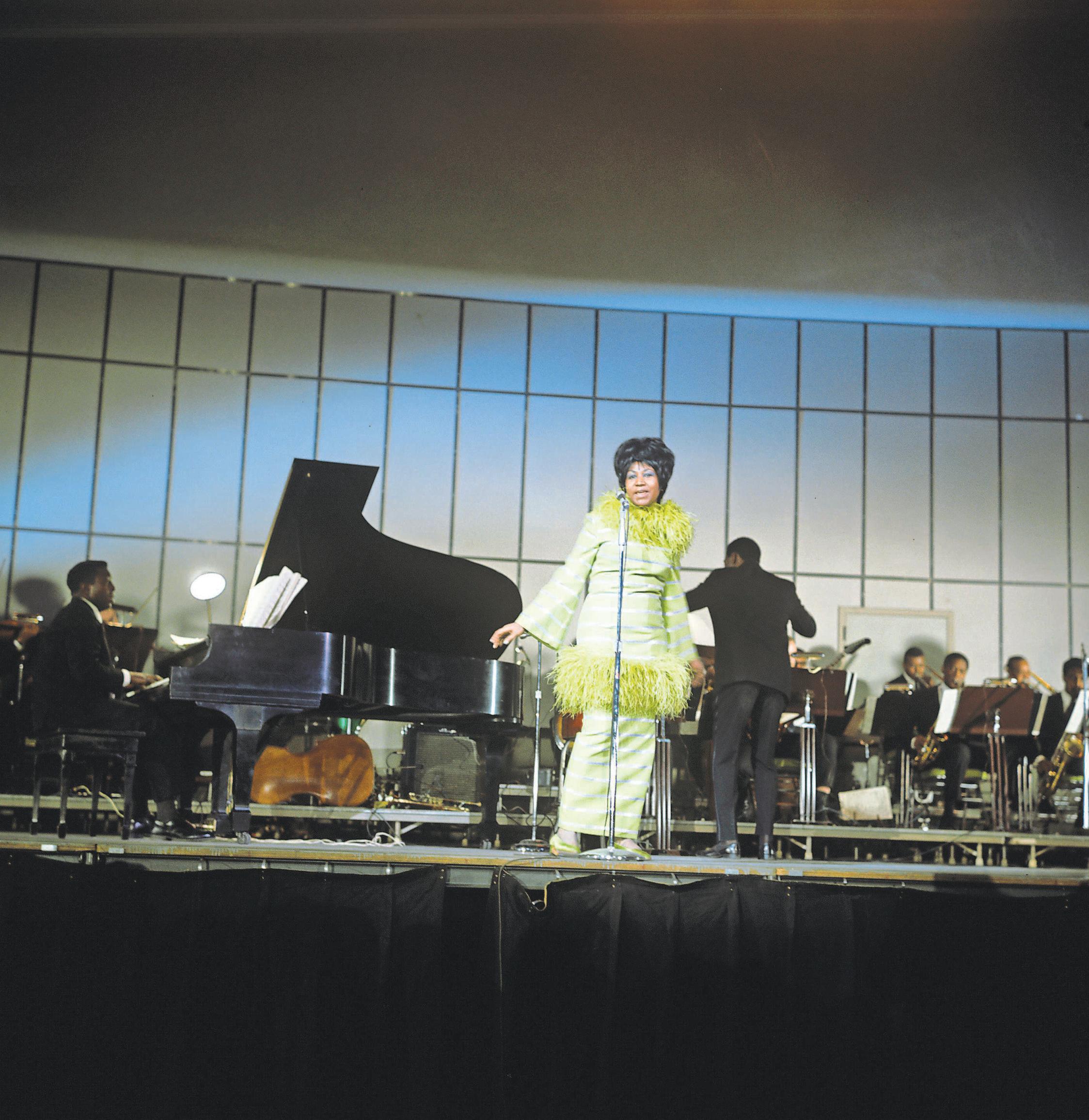
Aretha Franklin performs in 1969. She was in the middle of a string of gold records and hit singles, including “Respect,” which went to No. 1 in 1967. ABC PHOTO ARCHIVES
GENIUS: ARETHA
USA TODAY SPECIAL EDITION
Continued from page 24
with her chaperone, the piano teacher.
“Tears were coming down her face, and she explained to me in no uncertain terms about racism,” Washington recalled. “That one was a tough one. I then became a rebel because I was determined to make everybody a liar that felt that being of a certain hue was another thing.”
Clearly, Washington never gave up. Knowing she had the beauty and talent, she represented her hometown in the Miss North Carolina pageant.
“We went to the pageant, and I placed,” she said. “No other Black had ever even been there. I was the first. This was in North Carolina. Thank God I was of the mind where I did not consider the what-ifs. I was always constantly saying, ‘Why can’t I go over there?’ I felt as if I belonged there, and obviously, a lot of people felt I didn’t. At the end of the night, I got second runner-up. I was disappointed, but I knew why.”
Washington went on to Juilliard and has acted in such productions as “Beloved,” “The Parkers” and the TV version of “She’s Gotta Have It.” Portraying Aretha’s grandmother, she strove to “relay her strength and undying love for her family. I am still trying to figure just how old she was, just because her perseverance was amazing. She went from literally sharecropping to taking care of her great-grandchildren.”
Costume designer Jennifer Bryan grew up a world away from the American South. But she adored Franklin, too.
“Aretha Franklin was iconic to not just the U.S., but to all of the world,” Bryan said. “And it did not matter what language you spoke. She was like Josephine Baker in the ’20s to ’40s. It did not matter which country you were from. You could be in China and go ‘Aretha Franklin,’ and people would know. For me growing up in Jamaica, I absolutely remember that music and danced with it.
“A young Black woman, any woman, really identifies with ‘Respect,’ ” Bryan continued. “If that is not a female anthem, I don’t know what is. I was so excited and privileged and humbled, but really excited, to do this project because of who this was about. And I relate to her very strongly. I remember watching President Obama’s inauguration, and everybody knew of Aretha’s style in my age group or Aretha’s age group. It is like, how can you not think of that first when you think of Aretha Franklin?”
Neema Barnette, who directed two episodes of “Genius: Aretha,” has her own strong connection to the Queen of Soul and her empowering message.
“I am an Apollo girl,” Barnette said, referencing Harlem’s legendary Apollo Theater. “All through my teen years, I would get to the Apollo at noon and stay until midnight. I would have barbecue and spaghetti with my best friend and sit there from 12 noon until late Saturday. People would perform for three hours. And I saw Aretha seven times at the Apollo, which was a joy.”
Barnette’s love for the artist and her art only grew.
“ ‘Respect’ was an electrifying call to the gay movement and civil rights movement and anti-war movement,” Barnette recalled. “Aretha meant a lot, and her music spoke to my life. Her songs had a spiritual element that cannot be denied, and it hit me in my soul.
“The songs she selected crossed color lines, how deep she dug,” she said. “And as I got to tell her life story, I saw how her interpretations came from her experiences. Like most geniuses, her work came from her life, a product of her environment and the cultural baggage she carried.”
In the episodes Barnette directed, she was gratified to focus on the tremendous strength of women like Rachel Franklin.
“In episode three, where Cynthia (Erivo, who plays Aretha) is performing for Dr. King and singing ‘A Change Is Gonna Come,’ it is important that Rachel be there,” she said. “It comes right after a scene when they are coming out of a bus, and there is negative energy. Rachel put her hands on his and says, ‘Dr. King, are you all right?’ And, ‘I gave birth to C.L. in the cotton fields, and I prayed for a better life, and I never thought I would see it. So, thank you, Dr. King.’ ”
Barnette has worked steadily since directing a 1984 after-school movie, “One More Hurdle.” Her work includes “A Different World,” “Diagnosis Murder,” “Queen Sugar” and “Being Mary Jane.”
She takes a deep breath before revealing why this project resonates so deeply for her.
“As a Black female director, I am so honored and happy of being a part of telling Aretha’s story,” Barnette said. “It allows a certain female vision to manifest, when you know the culture and subtext, and can bring a richness and a certain nuance. That is what I think Aretha will bring to television — a deeper understanding of what women went through.”

Costume designer Jennifer Bryan grew up in Jamaica. “Aretha Franklin was iconic to not just the U.S., but to all of the world.” KWAKU ALSTON/ NATIONAL GEOGRAPHIC


